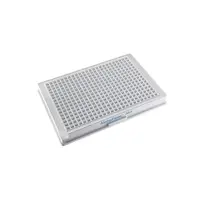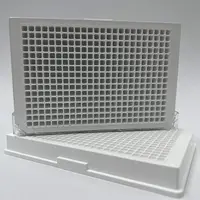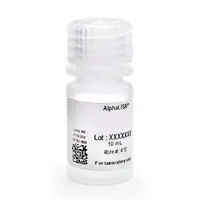
AlphaLISA Anti-methyl Histone H3 Arginine 2 (H3R2me) Acceptor Beads, 250 µg






AlphaLISA® Acceptor beads conjugated to an antibody against human Histone H3 that is methylated at arginine 2 (H3R2me). These beads can be used for AlphaLISA no-wash epigenetic writer and eraser assays.
For research use only. Not for use in diagnostic procedures. All products to be used in accordance with applicable laws and regulations including without limitation, consumption & disposal requirements under European REACH regulations (EC 1907/2006).
Product information
Overview
AlphaLISA® Acceptor beads designed to detect human Histone H3 that is methylated at arginine 2(H3R2me) in a homogeneous AlphaLISA assay.
In the AlphaLISA assay, a biotinylated Histone H3 peptide substrate is used in a biochemical enzymatic reaction with histone methyltransferase (HMT) and S-adenosylmethionine (SAM) cofactor. When the enzymatic reaction is stopped, the level of methylation is determined using antibody-coated AlphaLISA Acceptor beads and streptavidin-coated Alpha Donor beads. The streptavidin Donor beads capture the biotin moeity on the peptide substrate, while the antibody on the AlphaLISA Acceptor beads recognizes the specific epigenetic mark (methylation of Histone H3 on arginine 2). Alternatively, a biotinylated Histone H3 (C-term) antibody (Cat. No. AL118) can be used to capture full-length Histone H3 substrates to the streptavidin Donor beads. Upon laser irradiation of the bead complexes at 680 nm, short-lived singlet oxygen molecules produced by the Donor beads can reach the Acceptor beads in proximity to generate an amplified chemiluminescent signal at 615 nm. The intensity of light emission is proportional to the level of substrate modification.
Features:
- No-wash epigenetic assay
- Fully-validated mark specificity
- Substrate flexibility (peptide, protein, histone, nucleosome substrates)
- Easy-to-automate
- Fast assay optimization
Specifications
| Antibody Conjugates |
Anti-H3R2me
|
|---|---|
| Application |
Epigenetics
|
| Automation Compatible |
Yes
|
| Bead Type or Material |
AlphaLISA Acceptor
|
| Brand |
AlphaLISA
|
| Detection Method |
Alpha
|
| Experimental Type |
In vitro
|
| Format |
Microplates
|
| Molecular Modification |
Methylation
|
| One Unit Contains |
250.0 µg
|
| Species |
Porcine
|
| Unit Size |
250 µg
|
Video gallery




How can we help you?
We are here to answer your questions.




































